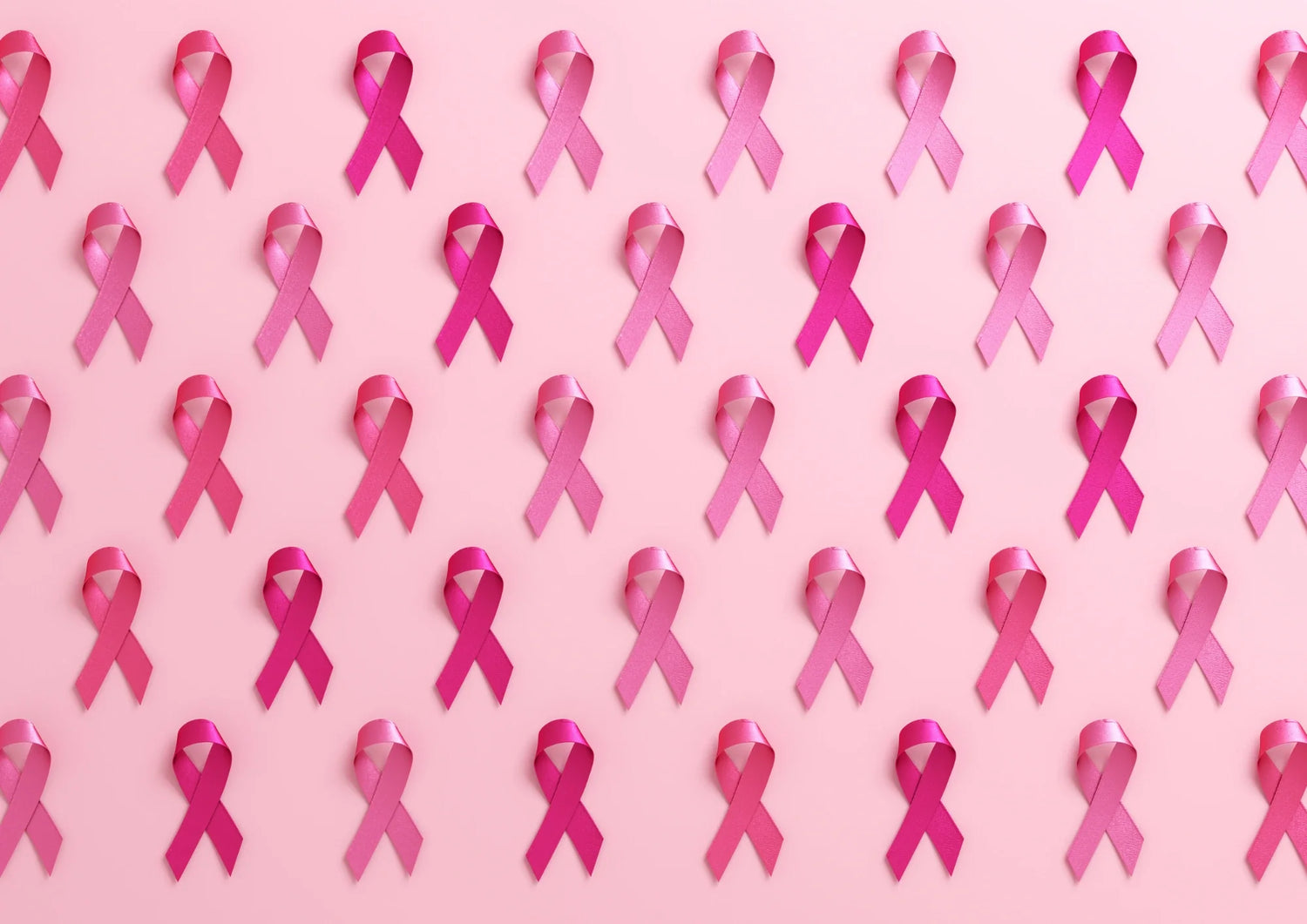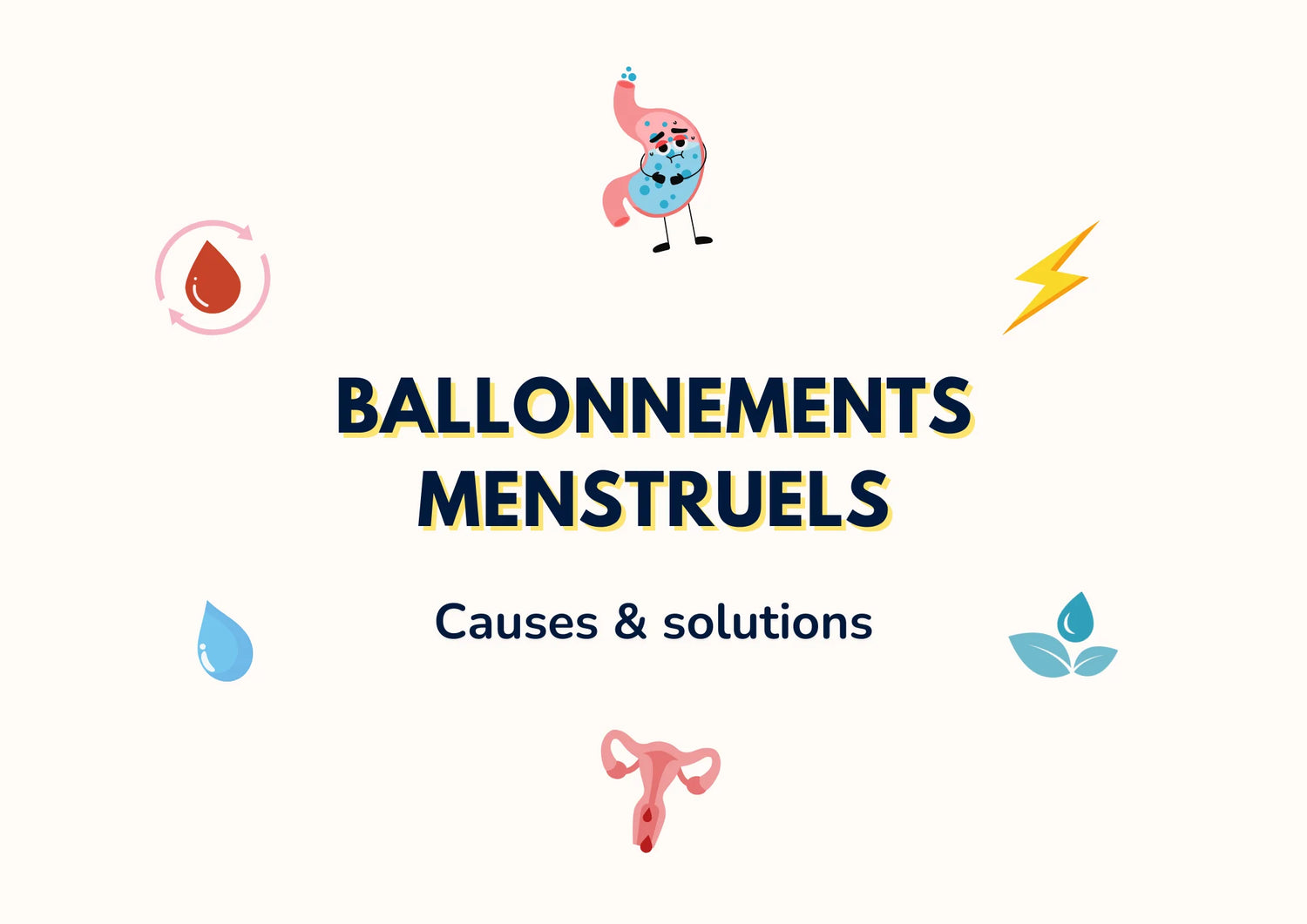Have yor ever felt a irritability sudden, of abdominal pain, a fatigue extreme or uncontrollable cravings a few days before your period ? You are not alone!
These events are part of the premenstrual syndrome (PMS), a sand of physical symptoms and emotional that occur just before your period and that can seriously impact your well-being. 😖
In this article, we will decrypt the PMS, understand why it occurs and above all, discover solutions to better cope with it in daily life. Because no, you do not have to endure these inconveniences without taking action! Ready to take back control? 💪
Summary
Reminder: the phases of the menstrual cycle

Menstruation: the start of a new cycle
It is the phase when you have your period. It lasts on average from 3 to 7 days.
During this period, the uterine mucosa which had thickened during the previous cycle detaches and evacuates in the form of bleeding.
Common symptoms:
- abdominal cramps
- fatigue
- lower back pain
- bloating
- mood swings
Follicular phase: your body is preparing
This phase starts on the first day of the period and lasts about 14 days. Your body starts to produce more estrogens, a hormone that stimulates the growth of the uterine lining in view of a possible pregnancy.
Common symptoms:
- feeling of renewed energy
- more stable mood
- increased libido
Ovulation: the peak of the cycle
Around the 14th day, votre ovulation takes place.
An egg is released and your body is biologically ready for fertilization.
Common symptoms:
- mild pain in the lower abdomen
- increased white discharge
- boosted libido
- slight increase in temperature
Luteal phase: the onset of premenstrual symptoms
If the egg is not fertilized, the rate of progesterone increases, preparing your body for menstruation.
It is during this phase that many of unpleasant symptoms appear.
Common symptoms:
- mood swings
- fatigue
- bloating
- breast tension
- snacks
Premenstrual Syndrome (PMS): What is it?
You feel that a few days before your period, everything becomes more difficult? You are more irritable, tired, bloated, or even prone to unusual pains? Welcome to the premenstrual syndrome ou SPM ! 😅
You are not alone: nearly 20 to 40% of women experience these symptoms before their menstruation.
(source)
But where does this famous premenstrual syndrome ? Why are some women more affected than others? And above all, how to relieve it effectively? We explain everything to you! 🤗
What is SPM?
The Premenstrual Syndrome (PMS) designates a set of physical symptoms et emotional that appear in the days before the period and generally disappear upon their arrival.
These manifestations are caused by the hormonal fluctuations, notably the sudden drop in estrogen and progesterone at the end of the cycle. This imbalance affects not only your body but also your brain, which explains emotional symptoms such as irritability or sudden sadness.
💡Note: The SPM can be manifest differently depending on the women and can evolve with age. Some women only experience mild symptoms, while others may find their daily lives significantly affected.
Specific symptoms of PMS
The SPM group one a large number of symptoms which vary from one woman to another.
Here are the most common ones:
Emotional and psychological symptoms of PMS
- Irritability and mood swings : an intense emotion can suddenly arise, without apparent reason.
- Increased sensitivity : do you cry over nothing in front of an ad? It's normal!
- Anxiety and stress : do you feel oppressed, restless without explanation? Hormones are the cause.
- Extreme fatigue : a physical and mental exhaustion that sets in without reason.
- Sleep disorders : insomnia or restless sleep may occur.
Physical symptoms of PMS
- Abdominal pain and cramps : the uterus is already starting to contract.
- Headaches and migraines : caused by the drop in estrogen levels.
- Bloating and water retention : do you feel like you've gained 2 kg overnight? It's temporary!
- Breast pain : the breasts become sensitive, swollen, sometimes painful.
- Digestive issues : diarrhea, constipation, or nausea may occur.
- Cravings and food urges : sudden craving for sugar or fat? Your body is seeking comfort! 🍫
In the most severe cases, the SPM peut evolve in Premenstrual Dysphoric Disorder (TDPM), a more intense form that can significantly impact daily life and may require medical follow-up. If you have any doubts, talk to your doctor!
Common misconceptions about PMS: debunking the myths
We often hear all sorts of things about the SPM. Among misconceptions, myth and reality, we don't know where to turn anymore! But what is it really about? Thet's sort it out together.
"The SPM is in the head" → FALSE ❌
The SPM is very real. It is caused by the hormonal variations at the end of the cycle.
These influence your mood, your energy, and even your digestion. It's not a whim, but a biological phenomenon!
“All women experience PMS” → FALSE ❌
Every woman is differentSome experience many symptoms, while others experience almost none.
And it can also evolve over time. If your PMS becomes very bothersome, consult a doctor.
"The PMS is an excuse to be in a bad mood" → FALSE ❌
No, you are not trying to "make a fuss". Your emotions are amplified by hormones, which can make you more sensitive or irritable. It's not your fault.
The important thing is to learn to recognize these emotions in order to manage them better.
"You can't do anything against PMS" → FALSE ❌
Fortunately, there is plenty of solutions ! A balanced diet, exercise, good stress management... and even medical treatments if necessary. You have tools to ease this period. 💪
Don't let anyone minimize what you feelYou have the right to listen to your body and adopt solutions that make you feel good. ✨
Why are some women more affected than others?
We are not not all equal in the face of PMSSome feel no symptoms, while others suffer every month.
Several factors explain this difference:
- The hormones Some women are more sensitive to hormonal fluctuations.
- Le lifestyle : stress, un unbalanced diet, lack of sleep, or lack of physical activity can worsen symptoms.
- The ground genetics : if your mother or sisters suffer from significant PMS, you are more likely to be affected.
- The levels of serotonin This neurotransmitter plays a role in mood and well-being. A low level can worsen anxiety and emotional disorders.
But beyond the physical and emotional symptoms, the SPM can also impact your daily life et vos relationships with othersLet's explore these impacts together and how to better understand them!
The impact of PMS on daily life and social relationships
Le SPM, it's not just a matter of pain or fatigue. It can also impact your daily life and your relationships with others. Do you feel more irritable? Less patient with your loved ones? It's normal! 😊

At work: how to manage?
It can be difficult to stay focused when fatigue or pain takes over. So here are a few tips for you:
- Plan your important tasks at the times when you have the most energy.
- Make some regular breaks, even short ones, to take a breather.
- Feel free to adapt your environment : an herbal tea, a hot water bottle, a comfortable outfit... everything matters!
- If possible, favor remote work or some more flexible hours based on your pain.
In a relationship or with your loved ones: how to talk about it?
Do you feel more sensitive, irritable, or even sad for no reason? It's not "in your head," it's hormonal. And it's normal. 💕
But your surroundings do not understand, and it affects you!
Talk about it together:
- Explain to your circle: "Right now, I'm going through a tough phase because of my cycle, it's not against you."
- Give them keys Sometimes, a simple hug, a chocolate, or a little patience is enough to ease tensions!
- Take a step back : if a dispute arises, ask yourself: "Will I react the same way in a few days?"
Avoid isolation and take care of yourself
With the SPM, you might want to snuggle under the covers and avoid everyone? We understand! 😅
But sometimes, moving a little helps to feel better !
- Engage in a gentle activity: stroll, yoga, relaxation with friends...
- Put on your favorite playlist and let yourself be carried away.
- Treat yourself to a cozy moment: warm bath, face mask, meditation.
Remember: this is just a phase. In a few days, everything will be better! 💖
Fortunately, there are some solutions to alleviate these symptoms and better experience this phase of the cycle!
Discover our practical tips to relieve PMS. 👇
How to relieve PMS
Even if we cannot completely prevent the SPM, there are some natural or medicinal solutions effective in reducing its intensity.

Here are our best tips:
Natural management of PMS 🪴
Adopt a balanced diet 🥗
- Increase your consumption of magnesium (bananas, almonds, dark chocolate) to limit irritability.
- Prefer the omega-3 (fatty fish, flaxseeds) to reduce inflammation and improve mood.
- Avoid overly salty foods to limit water retention and bloating.
Move, even a little 💪
- A simple fast walking or of yoga can help reduce muscle tension and boost your mood.
- Le sport releases endorphins, well-being hormones that compensate for the decrease in serotonin.
Learn to manage stress 😎
- Test it meditation or the deep breathing to calm your mind.
- Listen to the relaxing music where you practice the heart coherence.
Sleep good 💤
- Try to have a regular sleep rhythm, even at the end of the cycle.
- Avoid caffeine and screens before bedtime to improve the quality of your sleep.
Medical treatments if needed 💊
If your SPM is very intense and impacts your daily life, you can talk to your doctor about it.
There are several solutions:
- Dietary supplements Some women find relief with magnesium, vitamin B6, or omega-3 supplements.
- Hormonal contraception Some contraceptive pills help regulate hormones and reduce PMS.
- Medication treatments In case of very severe symptoms, a doctor may prescribe pain relievers, antidepressants, or other suitable treatments!
Now that you know more about PMS, you can identify your symptoms and try these tips to better cope during this time. You are not alone, and most importantly, you don't have to suffer in silence! 💕
To conclude, the SPM is not a fatality. Certainly, it can make life complicated, but you are not the only one feeling this way. 💜 By understanding your cycle menstruel, you can anticipate symptoms and manage them better !
Don't forget that each woman experiences her cycle differently and that the symptoms and solutions that work for you may not be suitable for others. If you have any doubts, consult your doctor and talk about it with those around you!
You deserve to feel good throughout your cycle. Listen to yourself, take care of yourself, and never feel guilty about what you feel. 💕


 https://mysorio.com
https://mysorio.com


